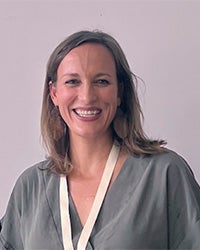
Kelly Arispe, associate professor of Spanish in the Department of World Languages, recently presented her research findings and scholarship activities at two international conferences.
The first was in Verona, Italy at La Asociación para la Enseñanza del Español como Lengua Extranjera (The Association for Teaching Spanish as a Foreign Language).
Her presentation titled, “El desarrollo de la comunicación interpersonal oral y la competencia intercultural a través del proyecto colaborativo, digital y abierto, Pathways” (Developing interpersonal speaking and intercultural competence through a collaborative, digital, open project, Pathways) describes the pedagogical framework used to engage the Pathways Project community in the co-creation of the activities in their repository. She showcased several examples of Pathways Project activities for Spanish teaching in conjunction with digital humanities sites that can be remixed with these activities to further augment intercultural competence. Arispe translated all Pathways Project professional development materials into Spanish and published them under a creative commons license so that attendees and future users have access to these materials in Spanish and can reuse, revise, remix and redistribute them for their own purposes in the future.
Arispe also presented her research at the Second Language Teacher Education conference in Vienna, Austria titled, “Open-Educational Practice: Meeting Critical Resources and Professional Development Needs for L2 Teachers.” Arispe reported the findings from the mixed-methods pilot study in the second cycle of a design-based research project that served as the proof of concept for her work under a National Endowment for the Humanities grant. The pilot study included a survey and Think-Aloud Protocol which tasked teacher participants to find two Pathways Project activities to meet their curricular needs and verbalize their experiences, thoughts, actions and feelings while interacting with the repository to gain a better understanding of how they use the activities for their own purposes, called localization. Survey responses revealed their assumptions about their expectations for the repository, identified what makes an activity of value and evaluated the ease of localization. Exit interviews further helped identify barriers to teachers’ open education resource implementation. Critical to the design-based research framework, Arispe discussed how she used these findings to make changes to both the tool (Pathways Project Open Education Resource) and the research design for the current final phase of the project funded in 2022-23 by the National Endowment for the Humanities Digital Humanities Advancement Grant.